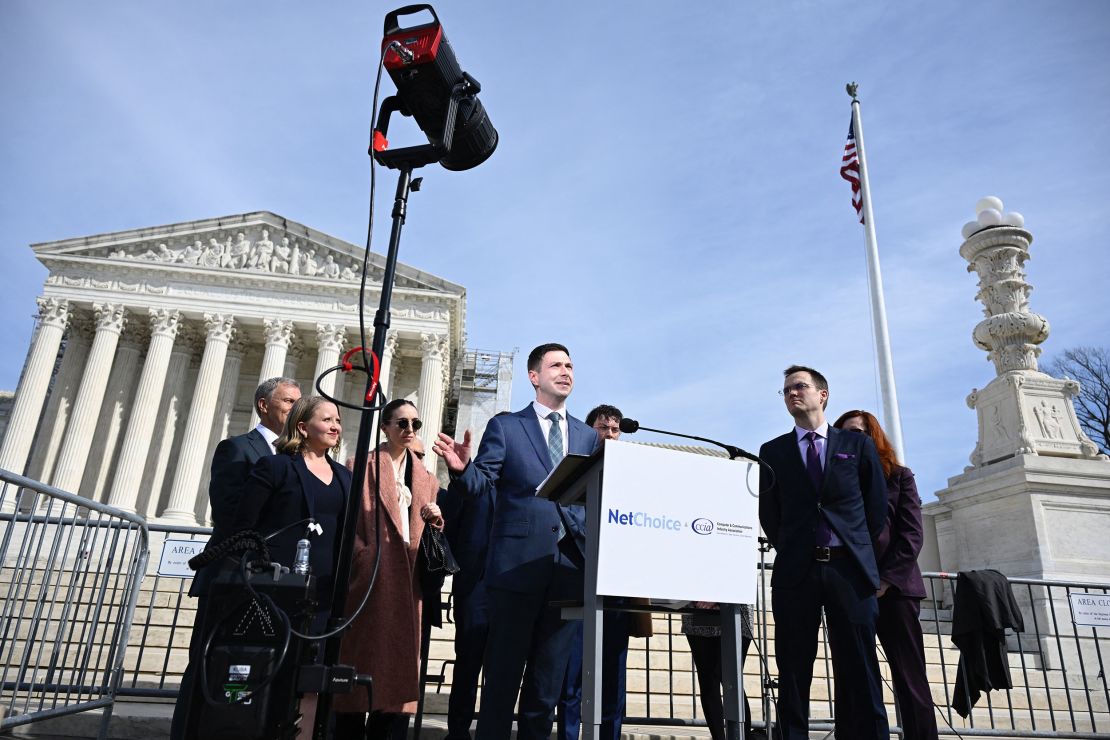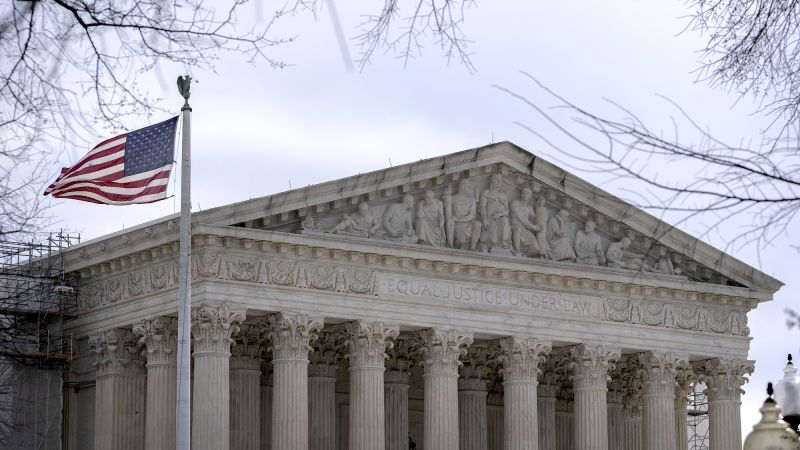Uber. Venmo. Etsy.
These are just some of the widely used online platforms that US Supreme Court justices said this week could be massively disrupted by a pair of Texas and Florida laws that are purportedly aimed at social media, but that could have vast unintended consequences for the rest of the digital economy.
After nearly four hours of oral argument on Monday, nobody — not even the states that wrote the laws — seemed sure just how far the legislation might reach.
The laws in question seek to prevent Facebook, YouTube and X from removing or demoting user content that expresses a viewpoint.
It’s obvious enough that the legislation would affect those social media giants, who are challenging the laws’ constitutionality through industry trade associations. The states say the laws are necessary to protect Americans’ online speech, particularly that of conservatives.
But in scrutinizing the laws’ scope and First Amendment impacts, justices from both sides of the ideological spectrum worried Monday that the legislation’s effects could spill far beyond major social media platforms.
The legislation could potentially be applied to online marketplaces, search engines, ridesharing operators, financial services and even cloud computing providers, some justices on the court said, exposing companies to expensive lawsuits alleging real or perceived discrimination against a user’s political or social views.
There have been some such lawsuits in recent years, but a Supreme Court ruling upholding the state laws could throw open the door to many more.
If that happens, many of the online platforms Americans take for granted could suddenly be turned into fresh battlegrounds for the culture war over election lies, health misinformation, obscenity, hate speech and other hot-button social issues, whether or not the companies have staked out a position on those issues.
Much of the court’s concern about unforeseen ripple effects zeroed in on Florida’s law. The state’s solicitor general, Henry Whitaker, struggled at multiple points to identify which platforms would be covered by the legislation, leading to consternation by some justices.
“Florida’s law, so far as I can understand it, is very broad,” said Justice Amy Coney Barrett, a member of the court’s conservative wing. “We’re talking about the classic social media platforms, but it looks to me like it could cover Uber. It looks to me like it could cover Google’s search engine. Amazon Web Services. And all of those things would look very different.”
Justice Sonia Sotomayor, one of the court’s liberals, observed that the Florida law “is so, so broad, it’s covering almost everything” on the internet, including Etsy listings and the website’s own recommendation engine.
Whitaker responded that he wasn’t certain how the law might apply to Etsy — before backtracking and acknowledging on the fly that it likely would cover the service.
“I’m not sure to what extent it actually would apply to Etsy,” Whitaker told Sotomayor. “I guess it would apply somewhat, [because] people are uploading user-generated content in connection with the sale of goods.”
Another liberal on the court, Justice Ketanji Brown Jackson, asked whether the Florida law would prevent LinkedIn from hosting a virtual job fair that specified who could participate.
“I’m not totally aware of all the facts of LinkedIn,” Whitaker said.
“I think that’s a problem in this case,” Jackson told him.
At other points, Whitaker seemed to lean into the law’s apparent breadth, vehemently telling justices that a range of non-social media services would certainly be subject to enforcement if they suspended a user.
“If Uber deplatforms a user, that is covered by our law,” he said. Whitaker suggested Gmail might be subject to the law, and “also WhatsApp … Those are constitutional applications [of the law].”
An attorney for Texas also appeared to struggle with the scope of that state’s law. Asked whether the Texas law would apply to more than just Facebook, YouTube and X, Texas Solicitor General Aaron Nielson told Barrett, “I don’t think so,” before reversing course and saying it may apply to direct messaging apps.
“The district court thought it covered WhatsApp,” Sotomayor said. “Do you think it doesn’t?”
“I don’t know,” Nielson said. “I don’t know the answer. That’s the best I can give you” based on the testimony in the Texas case so far. He added: “It might very well be WhatsApp.”
Under the Texas law, censorship covers a wide range of activities including “any action taken to edit, alter, block, ban, delete, remove, deplatform, demonetize, de-boost, regulate, restrict, inhibit the publication or reproduction of, or deny equal access or visibility to expression, to suspend a right to post, remove, or post an addendum to any content or material posted by a user, or to otherwise discriminate against expression.”

That law permits social media users to try to sue platforms for violations.
Florida’s law, meanwhile, prohibits tech platforms from suspending or banning the accounts of political candidates in the state, with violations carrying steep possible fines of up to $250,000 per day. It also allows individual social media users to try to sue platforms if they believe they have been unfairly censored or “deplatformed.”
Some of the justices and attorneys discussed whether some companies might pull their products completely from states such as Texas and Florida by erecting “geofencing” to exclude servicing those states.
There is nothing in the law preventing sites such as Meta from withdrawing from Texas, Neilson told Barrett, although he seemed uncertain about the specifics.
“If you choose to do business in Texas, you can’t darn well discriminate against somebody because they are in El Paso,” Nielson said of the Texas law’s provision barring geographic discrimination.
“And doing business in Texas is what, just allowing Facebook users to sign up in Texas, or is it Facebook accepting ad money from Texas corporations?” Barrett asked.
“That question has not been resolved by any of the Texas courts,” Nielson said. “But as I read it, it is, you have to have customers in Texas; you’ve entered into contractual relationships with Texans.”
There may be some situations where such non-discrimination laws might pass constitutional muster, suggested Justice Elena Kagan, one of the court’s liberals. But it would mean extending the reach of the Texas and Florida laws to cover many companies that were not an initial target of the legislation.
“When you’re running Venmo, you’re not engaged in speech activities,” said Kagan, highlighting how Venmo and its parent PayPal are primarily interested in transmitting peer-to-peer payments. For that reason, she said, perhaps Venmo doesn’t have the same speech rights as Facebook or Instagram, and Florida’s law could legally apply to Venmo.
Kagan appeared to overlook, however, that Venmo’s features include a quasi-social news feed listing payments made by other friends — potentially making it much more like the kind of speech platform Texas and Florida say they want more power to control.
Read the full article here




